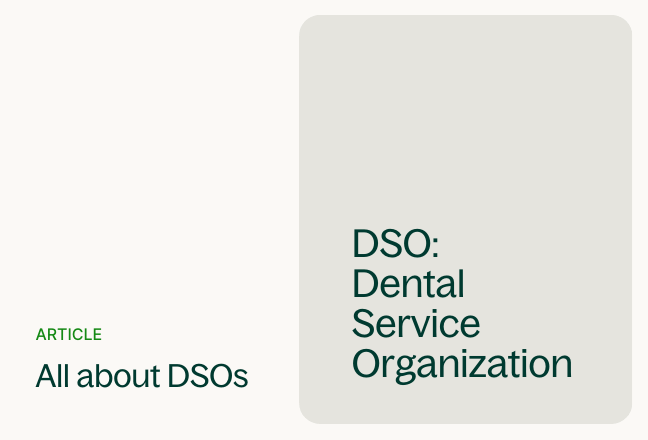DSO stands for “dental service organization,” they aim to help dentists manage the non-clinical side of a dental practice often taking on the marketing, administrative, and business aspects. This frees up more time for the dentist to focus on patient treatment and relationships with concessions including complete ownership and autonomy.
A DSO implements a dental provider contract between you, the dentist (and often the business owner) and them, the management company. They’re legally binding and need to be abided by on both sides.
Note: Dandy is not a DSO but a digital dental solution powered by a proprietary workflow to produce best-in-class lab work.
DSO dental affiliations are on the rise, in particular amongst newer dentists. In fact, 23% of dentists affiliated with DSO have been out of dental schools for 10 years or less, according to an American Dental Association 2023 survey. That number drops to 11% for those with 11 to 25 years of experience after dental school and 7% for dentists with over 25 years of post-dental school experience.
So are the newer dentists just looking to off-load part of their business tasks? Or, are they believing that DSOs can grow their businesses in other ways? Read on and form your own conclusions.
How are DSOs structured?
DSOs provide a centralized structure that provides administrative support, insurance claim support, operating support, marketing, and other nonclinical support. A DSO can buy and/or work with a dental practice brand, like Aspen Dental’s management group, The Aspen Group.
Other DSOs often work with brands and individual companies or specifically individual dentists practices. They’re working with a team. While that includes perks, it may also mean giving up some autonomy that comes with running your own business.
What services are provided by DSOs?
- Administrative/clerical work
- Patient scheduling
- Procurement
- Billing and insurance reimbursement
- Marketing and development
- Human resources
- IT
- Mentoring programs and continuing education
What types of deals can you sign with DSOs?
While dentists can, you don’t have to “buy into” a DSO. There are different types of deals an owner of a dental practice can sign with a DSO. They include:
- 100% affiliation: With this model you sell all of your practice to the DSO and handle patient care—or step away from the business completely!
- Joint venture model: In this model, you can sell about 60-90% of your practice and get cash right now but you’ll retain ownership that falls in the 10-40% range. The DSO and dentist both invest in the growth of the practice while the dentist controls the day-to-day clinical operations.
- Equity roll: The practice owner sells 100% of their practice to the DSO dental group. They then trade their equity into the DSO so their investment keeps growing.
- Sub-DSO: The practicing dentist who owns a business can be paid a large upfront payment, exit the transaction without debt, and maintain 40% ownership and profit share.
- Non-captive DSO: Some dentists can opt-in for certain non-clinical support for 3-6% of gross revenue.
- Direct investment with private equity: This is when an investor purchases ownership and bypasses dental service organizations. It can be a buyout or a minority growth investment. Then you, dental practice owner, could be a founding DSO member.
Some DSOs work in certain states, others only work with certain surgical specialties and others provide access to state-of-the-art technology and tools.
The rise of DSO affiliation
So why are we seeing so many dentists join DSOs? And what does the popularity of DSOs signify to the future of dentistry?
According to the Health Policy Institute’s Evolving Dental Practice Model report from 2022, about 13% of dentists in the U.S. are affiliated with dental service organizations.
Early-career dentists with less than five years out of dental school make up 27% of that demographic.
Dentists who have been out of dental school for 10 years or less tend to be more likely to practice in larger groups than those who have been out of school for longer. Nearly 25% of the dentists who have 10 years or less experience are affiliated with practices that have two or more locations. Of that group, 16% are associated with practices that have 100-plus locations!
It’s speculated that the COVID-19 pandemic accelerated the rate of dentists examining what is a DSO and joining these groups. That could be due to these DSOs being able to withstand the financial burdens the pandemic placed on the healthcare industry at that time, including closures, new infrastructures, and robust marketing plans to attract new clientele.
Dentists are either joining DSOs earlier in their careers or selling practices to DSOs to reduce administrative responsibility, have financial support, and enjoy some cost savings as they build their business and scale.
What are the benefits of joining a DSO?
Now that you’re keen on exactly what is a DSO, think strategically about why you might join one.
Perhaps you’re looking to focus more on your patients’ mouths and less on rescheduling their appointments and dealing with insurance companies and bills. We hear you. Those are some of the major benefits of joining a DSO. Others include:
- Taking advantage of advancements in digital dentistry without cost being barrier to entry: Many DSOs will provide access and training to the latest dental technology and innovative tools that can enhance your skills, like the digital intraoral scanner that Dandy offers free to their partners.
- Practice growth: If you didn’t minor in marketing or excel in your business classes, you might not feel confident in the skills required to find new customers. This is where a DSO can do the heavy lifting and address your practice’s marketing for a
- Business planning and financial management: DSOs can help dental practice owners with accounting, marketing, supply procurement, and access to capital they need for expansion.
- Insurance management: You probably didn’t get into dentistry because you were excited about dealing with insurance companies and claims. Hand this job off to a DSO so you can focus on what matters most to you—the clinical side.
- Digital dentistry: As dentist owners want to adopt more technology as part of their practice, joining a DSO can help with that—through training, integration strategies, and cost-saving measures. If this is a factor for you, please learn about the free digital setup and continued training Dandy offers.
- Recruiting & HR: When you’re part of dental service organizations, they can help you attract and hire qualified candidates as well as let you know about candidates they already have in the system that may be a fit.
What are the drawbacks of joining a DSO?
- Loss of autonomy: You will have less of a say in your business, including marketing, day-to-day admin operations, practice hours, and even vacation time. Relinquishing some control can be difficult for business owners.
- Changes in patient care: Change will likely be uncomfortable at first and come with some hiccups. The DSO might implement new processes that you don’t agree with and come with some grumbles from patients.
- Potential for reduced income/burnout: Depending on the contract you signed, there could be restrictions with income caps for you and employees.
- Culture clash/staff turnover: Some of your employees might not like the changes and will seek employment elsewhere.
- Less or zero equity in your business: You’ll probably need a different retirement plan from selling your business depending how much of a stake you released.
Dental Service Organizations and what they mean for your practice
The decision to join a dental service organization is entirely up to you and your practice needs. The biggest factors include your appetite for being a small business owner as well as a doctor, with autonomy and equity also top-of-mind. Before making any decisions, we’d suggest looking at your dental practice benchmarks to see where you think you may need help.



